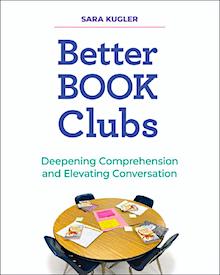How Reimagining Book Clubs Deepens Learning
Better Book Clubs: Deepening Comprehension and Elevating Conversation
By Sara Kugler
(Stenhouse Publishers 2022 – Learn more)
Reviewed by Sarah Valter

If you would have asked me at certain points in my teaching career, I would have said book clubs are a practice of frustration. A practice of chaos. A practice of never making reality match my expectations.
Sara Kugler’s opening line (above) in Better Book Clubs: Deepening Comprehension and Elevating Comprehension (2022) sets the tone and makes a promise she more than fulfills in this well-crafted, practical book.
Book clubs imitate the real-life reading work we want students to do, and as teachers we have the power to develop the skills our readers need to make the experience both meaningful and liberating.

Build a Foundation with Reading Workshop
The foundation of a good book club is a reading workshop in which routines and structure make space for learning. In the first chapter of Better Book Clubs, Kugler lays out the elements of a workshop that makes time and room for book clubs:
- minilessons that teach the skills students will need for discussion,
- independent reading to maximize students’ time with text, and
- the opportunity to reflect and share.
In the first chapter, she also establishes one of the best bonus features of the book: teaching tips in the margins that will push the thinking of both novice and experienced teachers.
Set the Stage with Scaffolding
“Complex skills take time to develop” (p. 18) is the mantra that runs through the rest of the book. Book clubs are not the starting point for our work in the classroom; they are the goal. In chapter 2, Kugler describes a clear pathway toward building the skills readers will need in book clubs through the scaffolding of Interactive Read-Alouds, Whole Class Conversations, and Read-Aloud Book Clubs.
By applying the teaching moves she suggests – providing topics that initiate conversations, giving kids time to think and prepare, and removing yourself from the conversation – you will be able to scaffold your students toward the rich conversations you want them to have.
This chapter also prompts teachers to consider the predictable challenges we all face when starting book clubs and outlines possible responses.
Launching Book Clubs
In Chapter 3 Kugler provides practical guidance on forming flexible groups, scheduling book clubs, and establishing club identity. Throughout this chapter she presents multiple pathways to successful book clubs, reminding readers that “[f]or each routine we teach to set up effective book clubs, we have a continuum of options ranging from high teacher support to increased student independence” (p. 36). Chapter 3 clearly outlines many of these options and provides practical guidance on making informed decisions in your classroom.
Talk as an Assessment Tool
Once book clubs have been established, Kugler suggests using the discussions between students as an opportunity to gather data and engage in informal assessment. She demonstrates the power of taking a club transcript and analyzing it to determine strengths and identify one next step for instruction. Chapter 4 reinforces that book clubs are a good time to assess both conversation skills and comprehension skills – and provides a table of language to look for in each of these domains.
Conversation and Comprehension
One of the complexities of book clubs is knowing what and how to teach. Kugler devotes chapter 5 to unpacking the steps from planning to teaching, emphasizing the need for clear, explicit, goal-focused instruction. In the instructional structure outlined in the book (p. 85), teachers gain a clear roadmap for how to provide instruction before, during, and after a book club discussion.
Book Clubs Over Time
In the final chapter of Better Book Clubs, Kugler returns to the underlying message of the book: Book clubs are built over time. She suggests ways to look for both immediate shifts in student conversation and comprehension and ways to see the long-term gains over time.
By providing transcripts of multiple conversations that happened weeks apart, Sara clearly illustrates how easy it is to see growth – and how impactful book clubs really are for growing readers.
Book Bonuses
Better Book Clubs not only outlines a clear pathway for building and strengthening book clubs in your classroom, but also supplies a variety of resources in the Appendix at the end. These include graphic organizers for observing and planning as well as anchor charts and lesson plans for book clubs at the Beginning, Developing, and Advanced levels.
Final Thoughts
For years I refined and tweaked (and complained about) book clubs in my classroom, never quite getting it “just right.” I wish I had had Sara Kugler’s book – and her expertise – to support me.
It may be easy to push book clubs aside when they aren’t going the way you envision, but the learning students do through these discussions is essential for both reading and building social connections.
Kugler sums it up best when she says, “Time spent engaging in a dialogue about a shared text provides students with the same sense of pleasure and connection it provides adults” (p. 6). Couldn’t we all use a little more pleasure and connection in our reading lives?
You can read Sara Kugler’s MiddleWeb article about better bookclubs here: How We Use Book Clubs to Empower Our Readers.
Sarah Valter is the district Literacy Coordinator for Lindbergh Schools in St. Louis, MO. In her two decades in education, Sarah has taught in the primary and intermediate grades, mentored new teachers, coached at the building and district levels, and led professional development in literacy.
Sarah is also an adjunct instructor at St. Louis University and has recently been added as a co-author for the Two Writing Teachers blog. Sarah believes strongly that all children and adults should have not only the skills to read and write, but also the motivation to live as lifelong readers and writers.






























